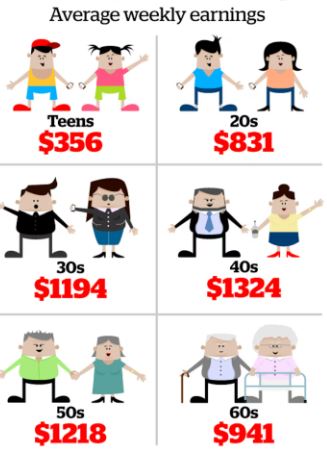How much are you earning compared to your own generation? The median wage, at $1273 per week, is a broad measure because it includes everyone from school leavers to business executives. Tiana Thorpe has analyzed the numbers so you can see how your earnings stack up against your peers.
Life begins at 40, and so do your best earning years—enjoy these good times while they last, mid-lifers.
Statistics New Zealand data reveals that Kiwis’ highest earning years peak in their mid to late 40s before starting to decline. The data, sorted into age brackets between 15 and 65+, shows the average gross earnings before tax.
In 2023, those aged 45-49 had the highest median income in the country, averaging $1733 weekly.
While Gen X enjoys a rare moment of glory, the newest generation of workers is at the bottom of the table. Unsurprisingly, the youngest members of the workforce (ages 15 to 19) earn the least, with an average weekly pay of $544.
However, income jumps significantly in the next age group. Twenty- to 24-year-olds earn an average of $972 a week, a $428 increase over teenage workers.
Among 25- to 29-year-olds, the average increases further to $1139.50 per week. Thirty-somethings take home an average weekly income of $1563, with 35- to 39-year-olds earning $1646.
Those in their early 40s earn slightly less, averaging $1644 per week. This minor dip precedes a salary lift in the late 40s, but salaries begin to drop again in the 50s. Kiwis in their 50s earn an average of $1598 per week, which falls to $1359.50 for those over 60.
Interestingly, the 60-64 age group saw the highest salary increase between 2022 and 2023, with a pay rise of $137. Retirees, on the other hand, earn an average of $1215 each week, likely reflecting that most have left the workforce.
Despite wage decreases in their 60s, earnings remain higher than those in their 20s and 30s, according to Strategic Pays data and analytics manager Natasha Stone.
“Younger people are most impacted by age on their salary due to a lack of workforce experience, even if they have qualifications,” Stone said.
Factors like gender and ethnicity also affect wages. For instance, the gender pay gap is minimal for 15- to 19-year-olds, who typically earn minimum wage. However, the gap widens with age, peaking at 16.7% for women aged 55-59, according to the Ministry for Women.
Migrants in New Zealand often face pay disparities, especially if their overseas experience isn’t recognized, says Migrant Careers Support Trust founder Garry Gupta. “Even experienced migrants working in New Zealand for years might only earn 70% of what a Kiwi would get,” he said. He advises those facing unfair salaries to advocate for themselves.-: TinBureau

